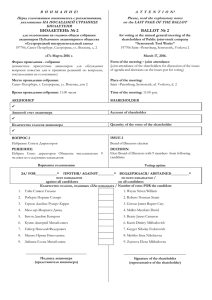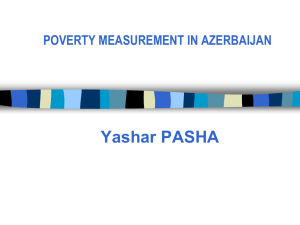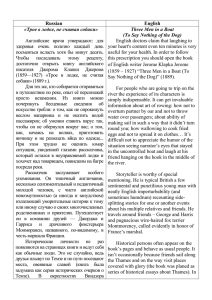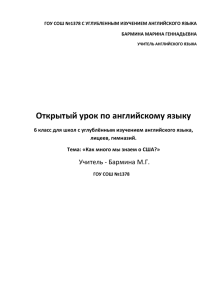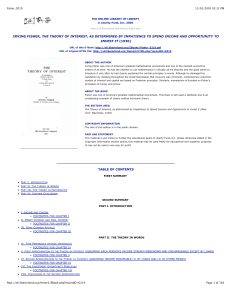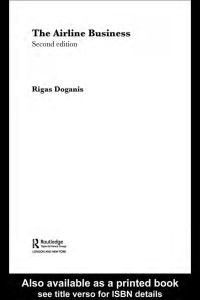IFRS_10_Moderov
реклама
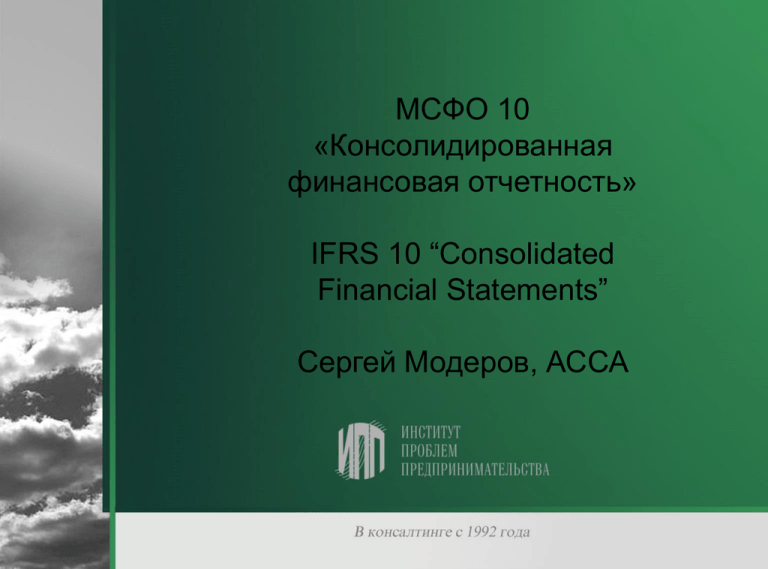
МСФО 10 «Консолидированная финансовая отчетность» IFRS 10 “Consolidated Financial Statements” Сергей Модеров, АССА Нововведения стандарта МСФО 10 • • • Новый стандарт –заменяет активно используемые МСФО (IAS) 27 «Консолидированная и отдельная финансовая отчетности» (Consolidated and Separate Financial Statements), а также ПКИ (SIC) 12 «Консолидация – компании специального назначения» (Consolidation – Special Purpose Entities) Вступает в силу для отчетных периодов, начинающихся 01 января 2013 года или позднее. Досрочное применение разрешено. Исправляет разноплановое применение различными Группами компаний положений предыдущего стандарта и интерпретации в отношении различного прочтения терминов «контроль» (control the power to govern the financial and operating policies of an entity so as to obtain benefits from its activities), различного практического определения наличия компаний специального назначения (special purpose entities - greater emphasis on risks and rewards) Нововведения стандарта (продолжение) • • • • • Введение конкретики в отношении отношения к «спонсируемым» компаниям, созданным для секьюритизации чего-либо, то есть к компаниям, «выводимым за баланс» Группы (‘off balance sheet vehicles’) Существенное давление в период финансового кризиса со стороны лидеров стран «большой двадцатки» (G20), организации «the Financial Stability Board» Уточнено понятие контроля, теперь оно слагается из трех составляющих Доля неконтролирующих акционеров (доля меньшинства, неконтролирующая доля, non-controlling interest) теперь обязательно отражается в составе капитала Отчета о финансовом положении (Баланса) Бухучет консолидации остался в соответствии с МСФО IFRS 3 «Объединение бизнесов» (Business Combinations) Контроль • • Инвестор обладает контролем над объектом инвестиций в том случае, если инвестор подергается рискам, связанным с переменным доходом от участия в объекте инвестиций, или имеет право на получение такого дохода, а также возможность влиять на доход при помощи осуществления своих полномочий в отношении объекта инвестиций (п.6) An investor controls an investee when it is exposed, or has rights, to variable returns from its involvement with the investee and has the ability to affect those returns through its power over the investee Контроль (продолжение) • • • • Инвестор обладает контролем над объектом инвестиций только в том случае, если инвестор (п.7): (a) обладает полномочиями в отношении объекта (властью над объектом) инвестиций (power over the investee); (b) подвергается рискам (exposure), связанным с переменным доходом от участия в объекте инвестиций (variable returns from its involvement with the investee), или имеет право (rights) на получение такого дохода ; и (c) имеет возможность использовать свои полномочия в отношении объекта инвестиций с целью оказания влияния на величину дохода инвестора (the ability to use its power over the investee to affect the amount of the investor’s returns) Определения • • • • Консолидированная финансовая отчетность - Финансовая отчетность Группы, в которой активы, обязательства, капитал, доход, расходы и потоки денежных средств материнского предприятия и его дочерних предприятий представлены как активы, обязательства, капитал, доход, расходы и потоки денежных средств единого субъекта экономической деятельности Consolidated financial statements - The financial statements of a group in which the assets, liabilities, equity, income, expenses and cash flows of the parent and its subsidiaries are presented as those of a single economic entity Контроль над объектом инвестиций – Инвестор обладает контролем над объектом инвестиций, если инвестор подвергается рискам, связанным с переменным доходом от участия в объекте инвестиций, или имеет право на получение такого дохода, а также возможность влиять на доход при помощи осуществления своих полномочий в отношении объекта инвестиций Control of an investee - An investor controls an investee when the investor is exposed, or has rights, to variable returns from its involvement with the investee and has the ability to affect those returns through its power over the investee Определения (продолжение 1) • Лицо, принимающее решения - Предприятие, обладающее правом принимать решения, которое является либо принципалом, либо агентом для других сторон • Decision maker - An entity with decision-making rights that is either a principal or an agent for other parties Пример • An investor acquires 48 per cent of the voting rights of an investee. The remaining voting rights are held by thousands of shareholders, none individually holding more than 1 per cent of the voting rights. None of the shareholders has any arrangements to consult any of the others or make collective decisions. When assessing the proportion of voting rights to acquire, on the basis of the relative size of the other shareholdings, the investor determined that a 48 per cent interest would be sufficient to give it control. In this case, on the basis of the absolute size of its holding and the relative size of the other shareholdings, the investor сoncludes that it has a sufficiently dominant voting interest to meet the power criterion without the need to consider any other evidence of power. Пример 2 • Investor A holds 40 per cent of the voting rights of an investee and twelve other investors each hold 5 per cent of the voting rights of the investee. A shareholder agreement grants investor A the right to appoint, remove and set the remuneration of management responsible for directing the relevant activities. To change the agreement, a two-thirds majority vote of the shareholders is required. In this case, investor A concludes that the absolute size of the investor’s holding and the relative size of the other shareholdings alone are not conclusive in determining whether the investor has rights sufficient to give it power. However, investor A determines that its contractual right to appoint, remove and set the remuneration of management is sufficient to conclude that it has power over the investee. The fact that investor A might not have exercised this right or the likelihood of investor A exercising its right to select, appoint or remove management shall not be considered when assessing whether investor A has power. Пример 3 • Investor A holds 45 per cent of the voting rights of an investee. Two other investors each hold 26 per cent of the voting rights of the investee. The remaining voting rights are held by three other shareholders, each holding 1 per cent. There are no other arrangements that affect decision-making. In this case, the size of investor A’s voting interest and its size relative to the other shareholdings are sufficient to conclude that investor A does not have power. Only two other investors would need to co-operate to be able to prevent investor A from directing the relevant activities of the investee. Пример 4 • An investor holds 45 per cent of the voting rights of an investee. Eleven other shareholders each hold 5 per cent of the voting rights of the investee. None of the shareholders has contractual arrangements to consult any of the others or make collective decisions. In this case, the absolute size of the investor’s holding and the relative size of the other shareholdings alone are not conclusive in determining whether the investor has rights sufficient to give it power over the investee. Additional facts and circumstances that may provide evidence that the investor has, or does not have, power shall be considered. Пример 5 • An investor holds 35 per cent of the voting rights of an investee. Three other shareholders each hold 5 per cent of the voting rights of the investee. The remaining voting rights are held by numerous other shareholders, none individually holding more than 1 per cent of the voting rights. None of the shareholders has arrangements to consult any of the others or make collective decisions. Decisions about the relevant activities of the investee require the approval of a majority of votes cast at relevant shareholders’ meetings—75 per cent of the voting rights of the investee have been cast at recent relevant shareholders’ meetings. In this case, the active participation of the other shareholders at recent shareholders’ meetings indicates that the investor would not have the practical ability to direct the relevant activities unilaterally, regardless of whether the investor has directed the relevant activities because a sufficient number of other shareholders voted in the same way as the investor. Пример 6 • Investor A holds 70 per cent of the voting rights of an investee. Investor B has 30 per cent of the voting rights of the investee as well as an option to acquire half of investor A’s voting rights. The option is exercisable for the next two years at a fixed price that is deeply out of the money (and is expected to remain so for that two-year period). Investor A has been exercising its votes and is actively directing the relevant activities of the investee. In such a case, investor A is likely to meet the power criterion because it appears to have the current ability to direct the relevant activities. Although investor B has currently exercisable options to purchase additional voting rights (that, if exercised, would give it a majority of the voting rights in the investee), the terms and conditions associated with those options are such that the options are not considered substantive. Пример 7 • Investor A and two other investors each hold a third of the voting rights of an investee. The investee’s business activity is closely related to investor A. In addition to its equity instruments, investor A also holds debt instruments that are convertible into ordinary shares of the investee at any time for a fixed price that is out of the money (but not deeply out of the money). If the debt were converted, investor A would hold 60 per cent of the voting rights of the investee. Investor A would benefit from realising synergies if the debt instruments were converted into ordinary shares. Investor A has power over the investee because it holds voting rights of the investee together with substantive potential voting rights that give it the current ability to direct the relevant activities. Пример 8 • The fund manager has a 2 per cent investment in the fund that aligns its interests with those of the other investors. The fund manager does not have any obligation to fund losses beyond its 2 per cent investment. The investors can remove the fund manager by a simple majority vote, but only for breach of contract. The fund manager’s 2 per cent investment increases its exposure to variability of returns from the activities of the fund without creating exposure that is of such significance that it indicates that the fund manager is a principal. The other investors’ rights to remove the fund manager are considered to be protective rights because they are exercisable only for breach of contract. In this example, although the fund manager has extensive decision-making authority and is exposed to variability of returns from its interest and remuneration, the fund manager’s exposure indicates that the fund manager is an agent. Thus, the fund manager concludes that it does not control the fund. Сергей Модеров www.ifrs.su – применение МСФО в РФ www.ifrs-audit.ru – применение МСФО и международных стандартов по аудиту в РФ

